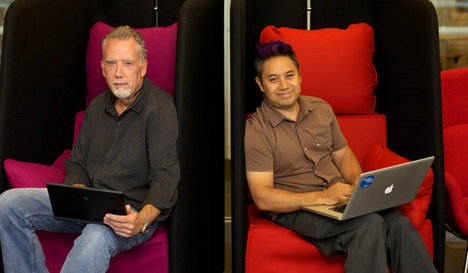 “At Citrix Systems, Berkley Reynolds, left, uses his Alienware laptop, and Alan Meridian, his MacBook Pro, paid for with stipends.” Source of caption and photo: online version of the NYT article quoted and cited below.
“At Citrix Systems, Berkley Reynolds, left, uses his Alienware laptop, and Alan Meridian, his MacBook Pro, paid for with stipends.” Source of caption and photo: online version of the NYT article quoted and cited below.
(p. B1) SAN FRANCISCO — Throughout the information age, the corporate I.T. department has stood at the chokepoint of office technology with a firm hand on what equipment and software employees use in the workplace.
They are now in retreat. Employees are bringing in the technology they use at home and demanding the I.T. department accommodate them. The I.T. department often complies.
Some companies have even surrendered to what is being called the consumerization of I.T. At Kraft Foods, the I.T. department’s involvement in choosing technology for employees is limited to handing out a stipend. Employees use the money to buy whatever laptop they want from Best Buy, Amazon.com or the local Apple store.
“We heard from people saying, ‘How come I have better equipment at home?’ ” said Mike Cunningham, chief technology officer for Kraft Foods. “We said, hey, we can address that.”
Encouraging employees to buy their own laptops, or bring their mobile phones and iPads from home, is gaining traction in the workplace. A survey published on Thursday by Forrester Research found that 48 percent of information workers buy smartphones for work without considering what their I.T. department supports. By being more flexible, companies are hoping that workers will be more comfortable with their devices and therefore more productive.
“Bring your own device” policies, as they are called, are also shifting the balance of power among electronics makers. Manufacturers good at selling to consumers are increasingly gaining the upper hand, while those focused on bulk corporate sales are slipping.
. . .
(p. B6) Letting workers bring their iPhones and iPads to work can . . . save companies money. In some cases, employees pay for equipment themselves and seek tech help from store staff rather than their company’s I.T. department. “You can basically outsource your I.T. department to Apple,” said Ben Reitzes, an analyst with Barclays Capital.
A similar B.Y.O.D. program at Citrix Systems, a software maker that also helps its clients implement such programs, saves the company about 20 percent on each laptop over three years. Of the 1,000 or so employees in Citrix’s program, 46 percent have bought Mac computers, according to Paul Martine, Citrix’s chief information officer. “That was a little bit of a surprise.”
For the full story, see:
VERNE G. KOPYTOFF. “More Offices Let Workers Choose Their Own Devices.” The New York Times (Fri., September 23, 2011): B1 & B6.
(Note: ellipses added.)
(Note: the online version of the article is dated September 22, 2011.)

